Katie Razzall
Reporting fromLeith

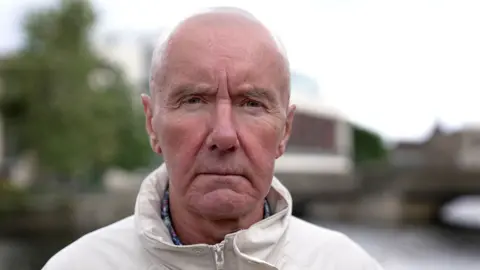 BBC
BBC
Irvine Welsh is pointing up to the second floor of a grey stone building in Leith, the port district of Edinburgh.
As he gets ready to publish a sequel to his 1993 cult novel Trainspotting, the author is showing me the window of the room, with its view over a local park, where he wrote that first book, which later became a hit film starring Ewan McGregor and Jonny Lee Miller.
The son of a Leith docker and a waitress - who did a course in electrical engineering, spent time in a punk band and was addicted to heroin as a younger man - Welsh had moved back home to Leith from London and "just started typing". He tells me that before writing Trainspotting he had decided "this is my last chance to do something creative".
Trainspotting follows the lives of a group of heroin-addicted friends in Edinburgh. Violent, often shocking and darkly funny, the book is a picture of the social decay sparked by the decimation of Britain's industrial heartlands. It was Welsh's first novel and sold more than a million copies in the UK alone.
But as he sat typing away, back in the early 90s, he had no idea it would do well. "I just wanted to get it done," he explains. It certainly paid off.

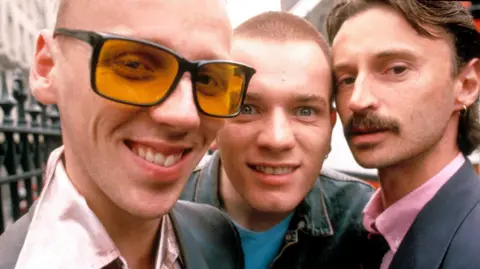 Shutterstock
Shutterstock
Ewen Bremner, Ewan McGregor and Robert Carlyle starred in 1996's Trainspotting, based on Irvine Welsh's successful book
The book and film tapped so successfully into the cultural zeitgeist that more than 30 years on, you can still book an official Trainspotting tour in Leith. But on a blustery Scottish summer's day, I'm getting a bespoke one from the writer himself, touring some of the key haunts that inspired him.
We head to the so-called Banana Flats, the curved building officially called Cables Wynd House that dominates the Leith skyline and where his character Sick Boy (played by Miller in the film) grows up.
We visit the Leith Dockers' Club where Renton (played by McGregor) goes with his mum and dad and where Welsh remembers hanging out "as a kid and sitting there with lemonade and crisps" and "feeling really sort of resentful" while everyone else was getting drunk.

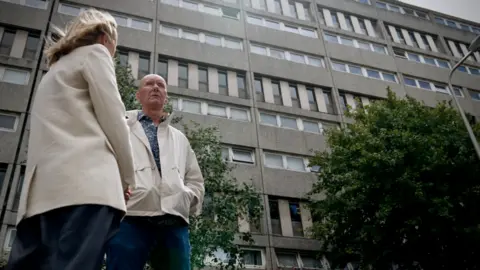 Adam Walker/BBC
Adam Walker/BBC
Katie Razzall talking to Irvine Welsh outside Cables Wynd House, better known as the Banana flats in Leith, which is part of the Trainspotting tour
Welsh's latest return to his characters is called Men in Love. He's previously written follow-up books and a prequel about the Trainspotting gang (he clearly can't get enough of them), but this new novel is set immediately after the first one finished, when Renton has run off with the money he and his friends have made from a big drug deal.
This time, Welsh is exploring what happens when young men start to fall in love and have relationships. He was partly motivated to write it, he says, because "we're living in a world that seems to be so full of hate and poison... I think that it's time we focused more on love as a kind of antidote to all that".
But don't expect saccharine stories of romance - this is Welsh, after all. The cheating, lying, manipulative - and at times, horrifying - behaviour of some of his characters is still much in evidence.
The book even has a disclaimer at the end explaining that because the novel is set in the 1980s, many of the characters "express themselves in ways that we now consider offensive and discriminatory".
Welsh says the publishers insisted on it. "They felt we live in such sensitive times that we need to make that point.
"We live in a much more censorious environment," he continues. While he accepts that misogynist terms in the book including "fat lassie" are hurtful and "there's a good reason why we don't say them", he worries that if the state starts to say "you can't talk about this, you can't talk about that, I think we're on a dangerous road".
The Men in Love story spans into the early 90s. It's being published at a time when Britain is indulging in a bit of 90s nostalgia, with Oasis on tour and Pulp's surprise set at Glastonbury getting rave reviews.
Welsh tells me he "never left" that era, but says younger generations also feel a nostalgia for it because "people had lives then".
He pins some of the blame for cultural change on the internet and social media which has become "a controlling rather than an enabling force".
As someone who understands addiction, Welsh hopes we'll be "more judicious" about using social media in future. He points to the way people have "their phones stuck to their face" while they are moving around.
"If we survive the next 50 years, that's going to look as strange in film as people chain smoking cigarettes did back in the 80s."

![Film Four [L-R] Spud (Ewen Bremner), Sick Boy (Jonny Lee Miller), Renton (Ewan McGregor), Begbie (Robert Carlyle) & Tommy (Kevin McKidd) in a scene from Trainspotting. Cast wearing casual dark tops, except Begbie in red jumper with cigarette - looking at document](https://ichef.bbci.co.uk/news/480/cpsprodpb/4a3b/live/5e50a290-5c2a-11f0-b5c5-012c5796682d.jpg.webp) Film Four
Film Four
[L-R] Spud (Ewen Bremner), Sick Boy (Jonny Lee Miller), Renton (Ewan McGregor), Begbie (Robert Carlyle) and Tommy (Kevin McKidd) in Trainspotting
He also thinks the internet is making us more stupid. "When you get machines thinking for you, your brain just atrophies." He fears we're heading towards "a post-democratic, post-art, post-culture society where we've got artificial intelligence on one side and we've a kind of natural stupidity on the other side, we just become these dumbed down machines that are taking instructions".
Trainspotting's success came in part he says at a time when people were willing to read more challenging, less formulaic books. And as the money rolled in, it gave him the freedom to write.
He's also a DJ and is releasing an album with the Sci-Fi Soul Orchestra to go with his new book. The disco tracks relate to the characters, the storyline and the "emotional landscape" of the novel.
Music is "fundamental" to his writing and he's also "looking for that four-four beat all the time while I'm typing".
He builds a playlist in his head for every character and theme.
Renton's into Iggy Pop, Lou Reed, Velvet Underground. Sick Boy also likes Marvin Gaye, Bob Dylan, New Order, he says.

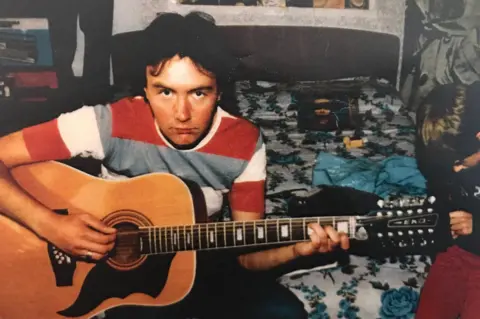 Irvine Welsh
Irvine Welsh
Irvine Welsh has always loved music, saying he "writes in a very musical type of way, looking for that 4-4 beat" when he's typing

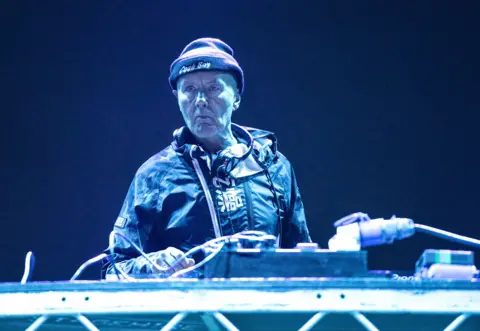 Getty Images
Getty Images
Irvine Welsh DJing during Playground Festival at Rouken Glen Park in Glasgow in 2021
The aggressive and violent Begbie likes "Rod Stewart and power ballads basically".
The singer recently told The Times that the public should give the Reform UK leader Nigel Farage a chance. I wondered if Irvine Welsh thinks that his Trainspotting characters would support that party if they were growing up now.
He pushes back, telling me the Scottish working classes "still have a radical kind of spirit. They're not really there to be the stooge of some public school idiot".
Although later he adds "people are so desperate that they'll go along with anybody who has that rhetoric of change".
Welsh has always been political and, as we walk around the area where he grew up, he describes how Margaret Thatcher ended centuries of shipbuilding in Leith "at a stroke". Five thousand dockers became none, he says.

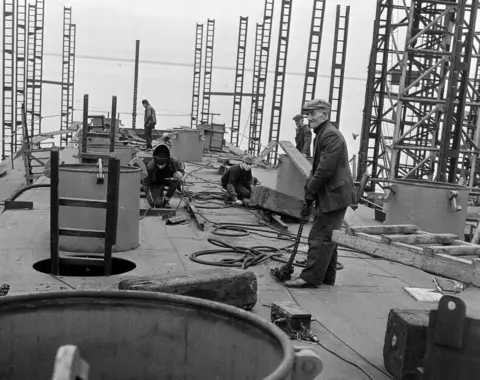 Henry Robb Ltd/SWNS
Henry Robb Ltd/SWNS
Workers at the Henry Robb Ltd Ship Builders in Leith in 1964 - reflecting Leith's proud history of shipbuilding
Trainspotting also resonated, he thinks, because it "heralded the adjustment to people living in a world without paid work. And now we're all in that position".
His argument is that Britain's class system is changing "because of this massive concentration of wealth towards the wealthy".
The working classes already have no money and now the middle classes are being pulled into more and more debt too and are less able to pass on their assets which makes life increasingly insecure.
"We're all members of the Precariat, basically. We don't know how long we'll have paid work if we do have it, and we just don't know how long this will last because our economy, our society is in a long-form revolutionary transformation."
In my time in Welsh's company, we haven't just toured Leith, I've had an insight into his brain, exploding with opinions on everything from our dystopian future, to why the best music was made in the analogue era and even to what would happen if he were offered a knighthood (it's a no, by the way).
When our time's up, he heads into the bar at the Dockers' Club to see a friend he first met at primary school 60 years ago. His old pal jokes to me that he's a plumber while Welsh is a millionaire author. You can see the affection between them.
Trainspotting may have changed Welsh's life entirely. But he's still plugged into the community that shaped him, and the Leith that he turned so spectacularly into fiction.
Men in Love is published on 24 July 2025









 English (US) ·
English (US) ·